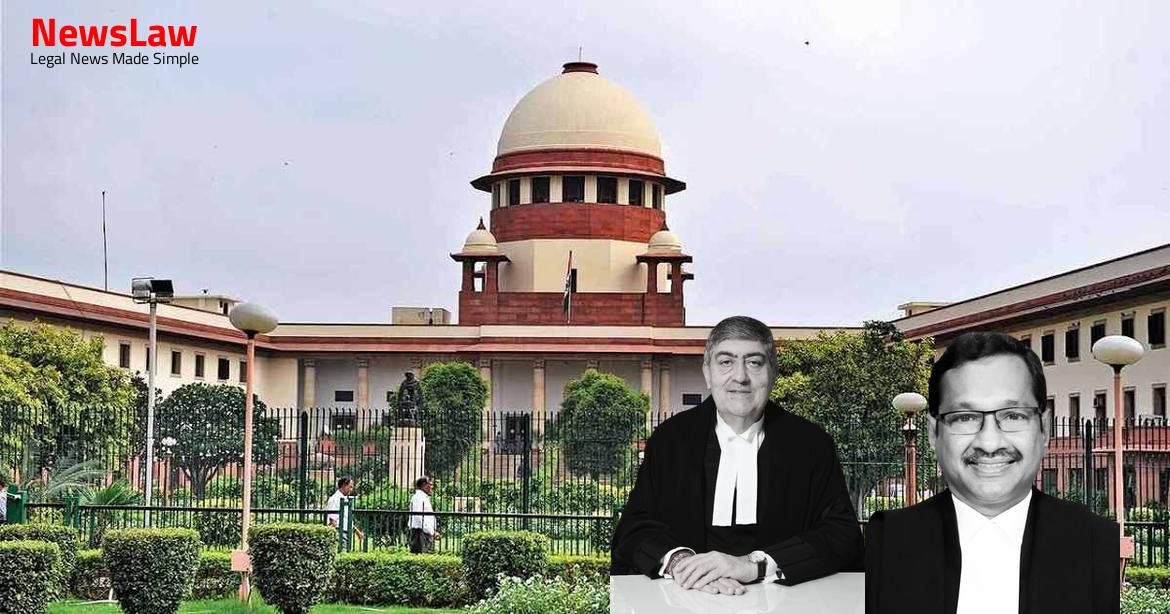In the case of Divgi Metal Wares Ltd vs. Divgi Metal Wares Employees Association, a dispute arose regarding the transfer of 66 workmen from the Sirsi Factory to the Pune Factory. The Industrial Tribunal rejected references filed by the workmen, leading to appeals and writ petitions. The Standing Orders and appointment/confirmation letters were crucial in determining the validity of the transfers. The Division Bench’s decision and the applicability of the Cipla Ltd. case were central to the legal proceedings.
Facts
- The appellant, M/s Divgi Metal Wares Ltd., filed a Writ Petition challenging an order dated 30.05.2002.
- The appellant manufactures automobile gears at factories in Pune, Maharashtra, and Sirsi, Karnataka.
- The Industrial Tribunal rejected three references filed by the workmen on 30.05.2002.
- 66 workmen from the Sirsi Factory were transferred to the Pune Factory.
- Workmen were paid in advance for one week’s leave but did not report at the Pune Factory.
- Transfers were made as per the terms of appointment letters and confirmation letters.
- References raised by transferred workmen were allowed by the Industrial Tribunal, leading to appeals and writ petitions.
- The Certified Standing Order dated 03.07.1989 was challenged before the Industrial Tribunal.
- The Standing Order modifications certified on 03.03.2001 were set aside partially by the Industrial Tribunal.
- The Deputy Labour Commissioner and Certifying Officer deleted specific words from the Standing Order on 30.09.1999.
- The Division Bench of the High Court allowed the appeal filed by M/s. Divgi Metal Wares Employees Association.
- The Tribunal determined that the transfers were not malicious.
- The specific individuals involved were not targeted in a negative manner.
- There was no intention to cause harm through the transfers.
Also Read: Case of Acquittal of Appellants in Murder Trial
Arguments
- The Division Bench’s reasoning that the 1999 amendment was not valid due to the absence of transfer provisions in the Schedule of the Act is considered unsubstantiated.
- Section 3 of the Act allows for additional items in the Standing Order despite provisions for every item in the Schedule.
- During the transfer period, the Standing Orders certified on 03.07.1989 were in effect as the writ petition against the appellate order was also rejected.
- Even with certain deletions in the 1999 amendment, based on the precedent set in the case of Cipla Ltd. vs Jayakumar R. and Another, the transfer of workmen from Sirsi Factory to Pune Factory should not be contested.
- The modified Standing Order under Section 7 and Section 10(3) would only be enforceable after seven days from the distribution of copies of the Appellate Authority’s orders to the employer and trade union representatives.
- The 1999 modification, which was challenged through an appeal, was eventually dismissed.
- The first two issues raised by Shri C.U. Singh were found irrelevant for the appeal.
- Even if the words directed to be deleted by the amendment of 30.09.1999 are deleted from Clause 20, the transfers could not have been held invalid based on the law laid down in the case of Cipla Ltd.
- The judgment of the court in Cipla Ltd. referred to Clause 3 and Clause 11 of the terms of appointment.
- The Division Bench of the Karnataka High Court held that there was no power to provide stipulation for transfer in the Standing Order, making the 1999 amendment unsustainable.
Also Read: Cheating Allegations: Quashing of FIR and Charge-sheet
Analysis
- Clause 20 of the Standing Orders lays down the provisions regarding employee transfers within the company.
- Any refusal to accept a transfer as per the Standing Orders can be treated as misconduct.
- Clause 31 ensures that the Standing Orders do not override any existing laws or contractual rights of the employees.
- Employees may be transferred between departments or jobs within the same unit/factory/office/establishment without affecting their normal wages.
- Employees may be required to work at different company establishments in India as directed, without extra remuneration.
- Employees must carry out assigned duties diligently and adhere to management stipulated hours.
- During employment with the company, employees are prohibited from engaging in other employment or business interests.
- Employees are governed by the Standing Orders applicable to workmen of the Company.
- Judgment in the Cipla Ltd. case refers to the arguments made by the employee’s counsel and relevant clauses of the Standing Orders.
- Clause 3 states that the employee will be in full-time employment with the Company.
- Respondent was appointed as a mechanic in appellant’s establishment at Bangalore.
- The Division Bench erred in not discussing the reasoning adopted by the Tribunal in their decision.
- The Division Bench erred in allowing the writ petition of the respondents and dismissing the writ petition filed by the appellants.
- Court held that transfer terms in the Standing Orders and appointment/confirmation orders did not conflict.
- Award failed to consider the appeal partly allowed in 2001 against the modification of the Standing Order.
- Standing Orders allowed transfer within the same unit/office, whereas appointment/confirmation orders allowed transfer to any department or works.
- Standing Orders did not prohibit transfer between establishments of the appellant.
- Confirmation that upon transfer, terms in the appointment order continue to apply, governed by rules of the new employment location.
- Standing Orders provision mentioned the non-derogation of any law or right under contract of service.
- Courts clarified that there was no conflict between the clauses in the appointment orders and the Standing Orders.
- Impugned judgment was found unsustainable due to lack of sustainability and conflicting with earlier Tribunal awards.
- The larger issue of modification powers of the standing order and the Certifying Officer was not considered and left for future adjudication.
- The challenge to the transfer orders was deemed unsustainable, and the transfers were found not to be mala fide.
- The Standing Order dated 03.07.1989 is in operation on the date of transfer orders and the date of the award.
- The dismissal of the appeal challenging the Standing Order on 06.04.1996 implies its continued operation.
- The Division Bench overlooked the legal precedent set in the case of Cipla Ltd., even though it was cited.
- In accordance with the law in Cipla Ltd., there was no need for the Division Bench to revisit the issue, as the facts align with the precedent.
- Standing Orders come into operation 30 days from sending authenticated copies under Section 5(3) or 7 days from the appellate authority’s order under Section 6(2).
- The amendment made in 1999 did not come into effect due to the appeal allowed by the Industrial Tribunal in 2001.
Also Read: NBCC (India) Limited vs. Zillion Infraprojects Pvt. Ltd.
Decision
- Writ Petition No.7993/2006 filed by the appellant is allowed.
- The appeals are disposed of in the aforesaid terms.
- The impugned judgment and order is quashed and set aside.
- Reference made to Section 7 of the said Act.
- The order dated 20.03.2006 passed by the learned single judge in Writ Petition No 44810 of 2001 is upheld.
- Writ Petition No.31808/2003 filed by the petitioner is dismissed.
- No orders as to costs are specified.
- The order passed by the learned Tribunal dated 28.02.2006 is quashed and set aside.
- Writ Appeal No 877 of 2006 filed by the petitioner is dismissed.
- Pending application(s), if any, shall stand disposed of.
Case Title: M/S. DIVGI METAL WARES LTD. Vs. M/S. DIVGI METAL WARES EMPLOYEES ASSOCIATION (2024 INSC 237)
Case Number: C.A. No.-002032-002032 / 2011



